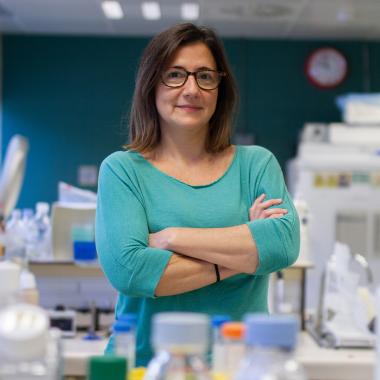
Núria de la Iglesia Zaragoza
Dr Núria de la Iglesia graduated in Pharmacy at the University of Barcelona and completed her PhD on liver metabolism under the supervision of Dr. Joan Guinovart and Dr. Joan Carles Ferrer in 2001. In 2002, she joined the laboratory of Dr Azad Bonni at Harvard Medical School, where she focused her postdoctoral studies on neural stem cells and glioblastoma biology. During this period, she was the recipient of a Fundación Ramón Areces postdoctoral fellowship and a Taplin postdoctoral award.
In 2009, she moved back to Barcelona with a Ramón y Cajal contract to set up the emergent research group on Glioma and Neural Stem Cells within the Clinical and Experimental Neuroscience Department at Institut d’Investigacions Biomèdiques August Pi i Sunyer (IDIBAPS). In 2016, she joined the Oncology and Haematology Department at IDIBAPS, as a Research Associate of the Translational Genomics and Targeted Therapeutics in Solid Tumors Team. After a short period of time working on advanced cell therapies at Leitat Technological Center in 2019-2020, she joined the NeoVaCan group at IrsiCaixa in 2020 to work on the identification of neoantigens with the aim of designing personalized immunotherapies for patients with cancer.
Dr de la Iglesia has supervised seven Master thesis and two PhD Thesis as sole director, and has published more than 20 papers in high impact scientific journals such as Cell Reports, Cell, Science, Neuron, Genes and Development and Clinical Cancer Research.
Multikinase Treatment of Glioblastoma: Evaluating the Rationale for Regorafenib.
Might Grant a Better Prognosis to Glioblastoma by Exerting Less Biological Effect on Telomeres and Chromosomes Than the C228T Mutation.
Converging and evolving immuno-genomic routes toward immune escape in breast cancer.
Virus-like particle-mediated delivery of structure-selected neoantigens demonstrates immunogenicity and antitumoral activity in mice.
Gal-1 Expression Analysis in the GLIOCAT Multicenter Study: Role as a Prognostic Factor and an Immune-Suppressive Biomarker.